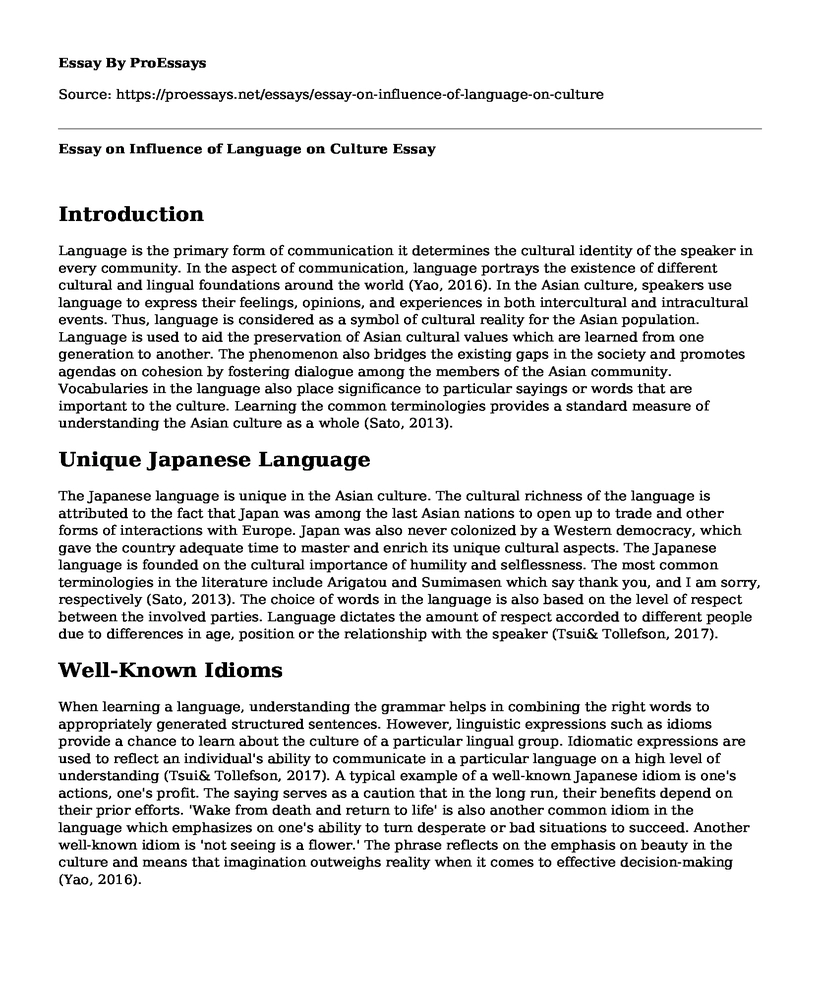Introduction
Language is the primary form of communication it determines the cultural identity of the speaker in every community. In the aspect of communication, language portrays the existence of different cultural and lingual foundations around the world (Yao, 2016). In the Asian culture, speakers use language to express their feelings, opinions, and experiences in both intercultural and intracultural events. Thus, language is considered as a symbol of cultural reality for the Asian population. Language is used to aid the preservation of Asian cultural values which are learned from one generation to another. The phenomenon also bridges the existing gaps in the society and promotes agendas on cohesion by fostering dialogue among the members of the Asian community. Vocabularies in the language also place significance to particular sayings or words that are important to the culture. Learning the common terminologies provides a standard measure of understanding the Asian culture as a whole (Sato, 2013).
Unique Japanese Language
The Japanese language is unique in the Asian culture. The cultural richness of the language is attributed to the fact that Japan was among the last Asian nations to open up to trade and other forms of interactions with Europe. Japan was also never colonized by a Western democracy, which gave the country adequate time to master and enrich its unique cultural aspects. The Japanese language is founded on the cultural importance of humility and selflessness. The most common terminologies in the literature include Arigatou and Sumimasen which say thank you, and I am sorry, respectively (Sato, 2013). The choice of words in the language is also based on the level of respect between the involved parties. Language dictates the amount of respect accorded to different people due to differences in age, position or the relationship with the speaker (Tsui& Tollefson, 2017).
Well-Known Idioms
When learning a language, understanding the grammar helps in combining the right words to appropriately generated structured sentences. However, linguistic expressions such as idioms provide a chance to learn about the culture of a particular lingual group. Idiomatic expressions are used to reflect an individual's ability to communicate in a particular language on a high level of understanding (Tsui& Tollefson, 2017). A typical example of a well-known Japanese idiom is one's actions, one's profit. The saying serves as a caution that in the long run, their benefits depend on their prior efforts. 'Wake from death and return to life' is also another common idiom in the language which emphasizes on one's ability to turn desperate or bad situations to succeed. Another well-known idiom is 'not seeing is a flower.' The phrase reflects on the emphasis on beauty in the culture and means that imagination outweighs reality when it comes to effective decision-making (Yao, 2016).
The Uniqueness of Japanese Culture
The existence and inclusion of various aspects of the traditional Japanese culture into the modern society indicate the culture is adequately rich, in both social and historical contexts. The colorful culture is dated back to the nation's prehistoric times known as the Jomon period. The distinctiveness of the Japanese culture is attributed to its island geographical location and its historical isolation from the world during the Tokugawa regime. Special events and ceremonies are marked with colorful decorations, food, and dance. Other unique customs include removing shoes when entering a building, sitting on the floor during meals and bowing upon salutations (Sato, 2013).
References
Sato, K. (2013). Sociology of Culture in Transition. International Journal of Japanese Sociology, 22(1), 32-40.
Tsui, A. B., & Tollefson, J. W. (2017). Language policy and the construction of national cultural identity. In Language policy, culture, and identity in Asian contexts. 11-32.
Yao, C. W. (2016). "Better English is the Better Mind": Influence of Language Skills on Sense of Belonging in Chinese International Students. Journal of College & University Student Housing, 43(1), 74-89.
Cite this page
Essay on Influence of Language on Culture. (2022, Mar 27). Retrieved from https://proessays.net/essays/essay-on-influence-of-language-on-culture
If you are the original author of this essay and no longer wish to have it published on the ProEssays website, please click below to request its removal:
- Multidimensional Model of Racial Identity Essay
- Paper Example on Effects of Popular Culture on Technology
- Globalization on the Ultimate Fighting Championship (UFC) Paper Example
- Essay Example on Joe the King: 14-Year-Old Struggling in Abusive Family
- Essay on Young Adults Experiencing Major Life Milestones Later Than Their Parents
- Essay on Unconditional Love Beyond Blood Ties: A Story of My Life
- Essay Example on Family System Theory: Understanding Relationships for Successful Functioning







